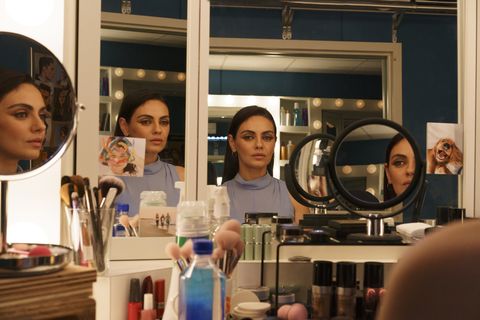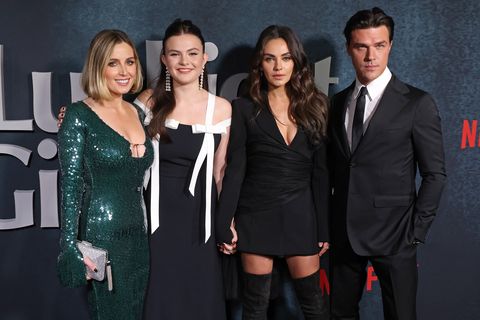Note: The following article contains discussion of sexual misconduct.
Luckiest Girl Alive was the most-watched Netflix movie across Oct 3-9, clocking 43.08 million hours viewed ahead of Mr Harrigan's Phone which was released two days earlier.
And once viewers realised it was inspired by a true story, it's surely kept them reading about the true story since their watch.
The movie sees Mila Kunis play Ani FaNelli, a New Yorker who appears to have it all including a sought-after position at a glossy magazine. However, she is forced to confront a dark truth about her teenage years when a director of a crime documentary asks her to tell her side of a shocking incident.
Luckiest Girl Alive is based on the book of the same name by Jessica Knoll, who adapted her own book for the movie. And both the movie and the book were inspired by a harrowing real-life experience of Knoll's.
Since it's kept as a reveal in the movie, we're flagging that there are spoilers ahead for Luckiest Girl Alive if you haven't seen the movie yet.
Luckiest Girl Alive true story
It's revealed in Luckiest Girl Alive that as a teenager, Ani was gang raped by three of her male classmates, who all denied it took place, leading Ani to be doubted by everybody, including her own mother.
Later in the movie, a school shooting takes place and two of Ani's rapists are killed, while the third, Dean, is paralysed from the waist down. He goes on to become a gun-control activist for the Senate.
It wasn't until a year after the book was published that Knoll revealed in a personal essay on Lenny Letter that she experienced a similar gang rape when she was a student at a private school.
"I always feel a little undeserving of being called, like, brave or courageous, because I had to [open up] in fiction. There were these duelling things inside of me. I desperately craved the release of getting my story out on paper, and the validation of recognising what had happened to me as rape. I needed that," she told Today.
"But on the other hand, I was frightened that people would read it and come to the same conclusion that people did when I was in high school, which was that no violation had occurred and that I had somehow participated in it."
In the movie, Ani recites (almost word-for-word) one section of Knoll's piece when she confronts Dean: "My anger is like carbon monoxide. It's odourless, tasteless, colourless, and completely toxic."
While what Ani experiences is inspired by Knoll's life, the shooting was fictional for the book. "I still had the idea in my head that what happened to Ani wasn't bad enough, because that's what happened to me. I thought I had to make it worse," she told Today.
"She's now carrying the fact that they are 'good victims'. They've been gunned down. The community is mourning their deaths. Then, on top of it, Dean does something good and powerful with what happened to him. It becomes even harder for her to come forward."
Like Jessica Knoll did in real life, Ani is also able to tell her truth when she gets a job at the New York Times Magazine, publishing an essay like Knoll did of her experience. This wasn't in the original book, meaning the movie ends in a different way.
"It's very meta that it's a fictional story, a fictional character, but there are even more elements that are inspired by my real life," Knoll told EW.
"I like that we looked at the year that followed me writing the book and writing my essay and the reaction to it and going on a TV show to talk about it. I liked that we embedded that into the movie because I think it makes for a more epic journey that Ani goes on."
Kunis is aware that the ending – which sees Ani on the subway watching people read her story, before she confronts somebody who criticises her on the street – might be divisive, but that's part of the reason why they did it.
"It's not cookie cutter, and not everybody experiences this movie the same way. So many people had such a different experience while watching the same piece of content, including the ending," she added.
"A lot of people didn't like it, but I fought so hard for it to stay in. I'm really glad that we won this fight because it's so powerful."
Luckiest Girl Alive is now available to watch on Netflix.
If you've been affected by the issues raised in this story, you can access more information from Rape Crisis England and Wales, who work towards the elimination of all forms of sexual violence and sexual misconduct, on their website or by calling the National Rape Crisis Helpline on 0808 802 9999. Rape Crisis Scotland’s helpline number is 08088 01 03 02.
Readers in the US are encouraged to contact RAINN, or the National Sexual Assault Hotline on 800-656-4673.

















